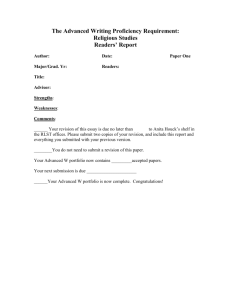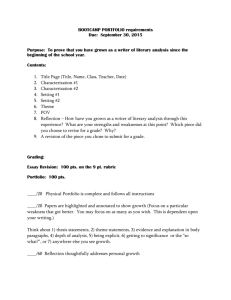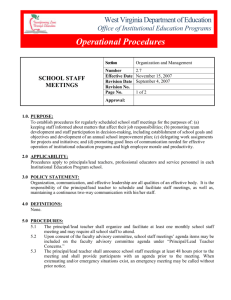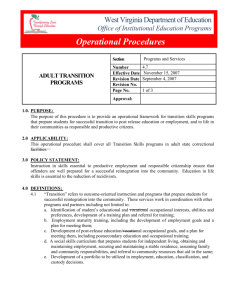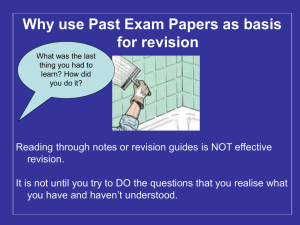final portfolio overview 102.doc
advertisement
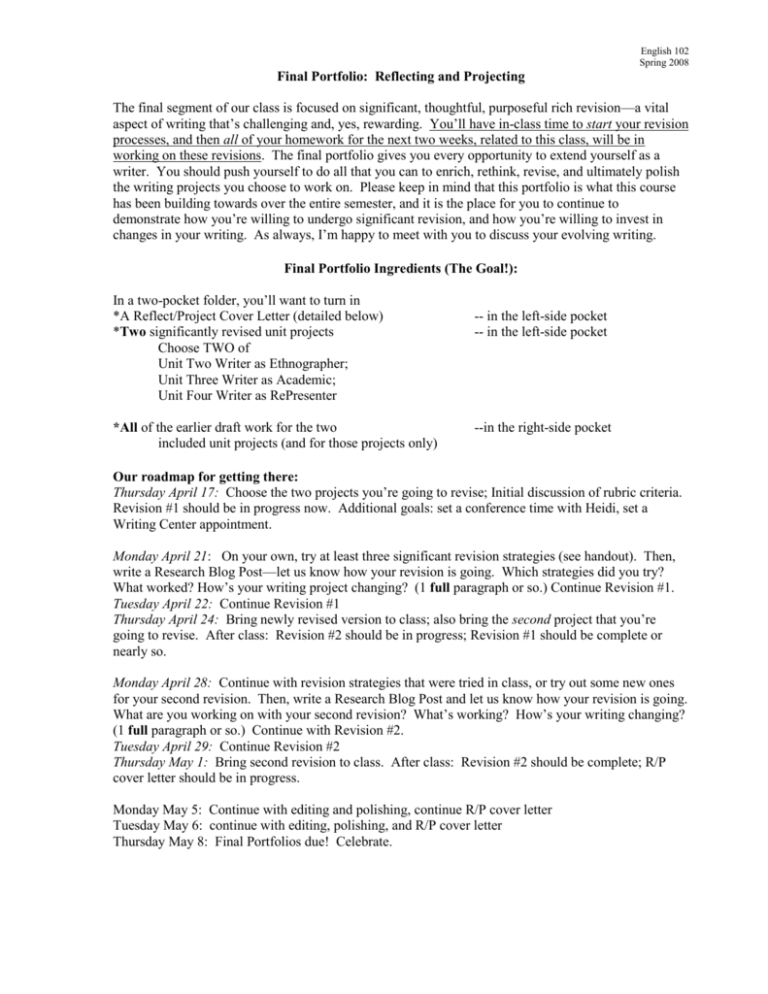
English 102 Spring 2008 Final Portfolio: Reflecting and Projecting The final segment of our class is focused on significant, thoughtful, purposeful rich revision—a vital aspect of writing that’s challenging and, yes, rewarding. You’ll have in-class time to start your revision processes, and then all of your homework for the next two weeks, related to this class, will be in working on these revisions. The final portfolio gives you every opportunity to extend yourself as a writer. You should push yourself to do all that you can to enrich, rethink, revise, and ultimately polish the writing projects you choose to work on. Please keep in mind that this portfolio is what this course has been building towards over the entire semester, and it is the place for you to continue to demonstrate how you’re willing to undergo significant revision, and how you’re willing to invest in changes in your writing. As always, I’m happy to meet with you to discuss your evolving writing. Final Portfolio Ingredients (The Goal!): In a two-pocket folder, you’ll want to turn in *A Reflect/Project Cover Letter (detailed below) *Two significantly revised unit projects Choose TWO of Unit Two Writer as Ethnographer; Unit Three Writer as Academic; Unit Four Writer as RePresenter *All of the earlier draft work for the two included unit projects (and for those projects only) -- in the left-side pocket -- in the left-side pocket --in the right-side pocket Our roadmap for getting there: Thursday April 17: Choose the two projects you’re going to revise; Initial discussion of rubric criteria. Revision #1 should be in progress now. Additional goals: set a conference time with Heidi, set a Writing Center appointment. Monday April 21: On your own, try at least three significant revision strategies (see handout). Then, write a Research Blog Post—let us know how your revision is going. Which strategies did you try? What worked? How’s your writing project changing? (1 full paragraph or so.) Continue Revision #1. Tuesday April 22: Continue Revision #1 Thursday April 24: Bring newly revised version to class; also bring the second project that you’re going to revise. After class: Revision #2 should be in progress; Revision #1 should be complete or nearly so. Monday April 28: Continue with revision strategies that were tried in class, or try out some new ones for your second revision. Then, write a Research Blog Post and let us know how your revision is going. What are you working on with your second revision? What’s working? How’s your writing changing? (1 full paragraph or so.) Continue with Revision #2. Tuesday April 29: Continue Revision #2 Thursday May 1: Bring second revision to class. After class: Revision #2 should be complete; R/P cover letter should be in progress. Monday May 5: Continue with editing and polishing, continue R/P cover letter Tuesday May 6: continue with editing, polishing, and R/P cover letter Thursday May 8: Final Portfolios due! Celebrate. English 102 Spring 2008 Reflect/Project Cover Letter Directions Length: 3+ pages single-spaced Purpose of the cover letter: The R/P Cover Letter is a vital part of your portfolio. It should be written last, after you’ve thoroughly revised both of the included writing projects. This cover letter is a highly detailed, thoughtful reflection on your work in this class; on your sense of yourself as a writer; on the “learning behind the writing projects” that you’ve done; on what conscious, deliberate connections you can make to work you will be doing next semester and in your future college career. Audience: Imagine that you’re writing for someone who doesn’t know you or your work, and you want to show that person all you can about what you’ve done and written and learned through using your own included pieces as evidence. Writing the R/P cover letter gives you the wonderful opportunity to really look hard at what you’ve done and where you’re going with it. Genre: Please do write these in letter format. You can address them to me, and/or to me/your class colleagues. The R/P cover letter provides a lens for anyone reading your portfolio to understand it; it’s crucial! All R/P Cover Letters should address the following: Discuss what your expectations were for you as a writer, thinker, learner at the beginning of 102. How have you grown as a writer (if you have)? What are you especially proud of from this semester? Why? Take us behind the scenes for the two revised unit projects included here. For each one, discuss o what changes you’ve made, why, and what the results of those changes are; o how it demonstrates your ability to write for different audiences and purposes. What kinds of decisions do you make? How? o your evolving sense of yourself as a researcher, as represented in this portfolio. What kinds of research can you do that you couldn’t do at the beginning of the semester? How is that represented in your portfolio pieces? o How your conception of your writing process(es) have changed this semester. If so, in what ways? Consider where you’re headed next as a writer – choose one or two “next places” to make some projections about (this could be next semester’s classes, your major classes, your life). While you won’t likely be given these particular kinds of writing tasks again, what underlying strategies about writing or how to approach writing/research have you learned about in 102 that you’d like to remember for other situations? Why? A Final Note: Suggestions for Success on the Final Portfolio By this point in the semester, I’m expecting you to be really invested in doing all you conceivably can to do your best. I’m here to help, of course! But there’s little limit, other than your own time and energy, on what you can do. To ensure that you’re doing all you can do to succeed on the Final Portfolio, you should: Schedule 6-9 hours per week, if not more, as writing/revising time. Set goals for yourself with each piece you revise. Concentrate on one piece at a time. Schedule an appointment or two at the Writing Center. Schedule a conference or two with Heidi. Immerse yourself in the final portfolio rubric—take in and understand the language. Write, rewrite, and write some more!
